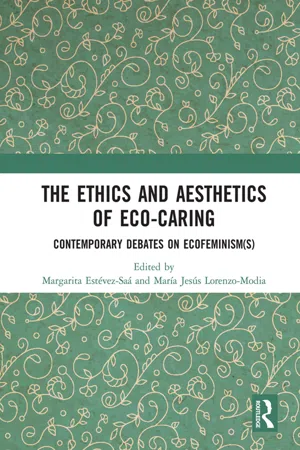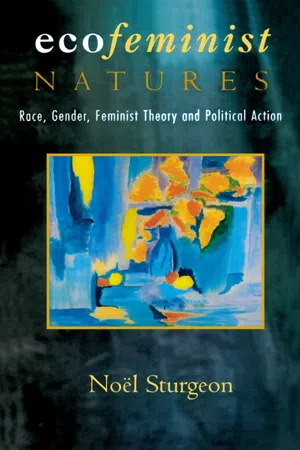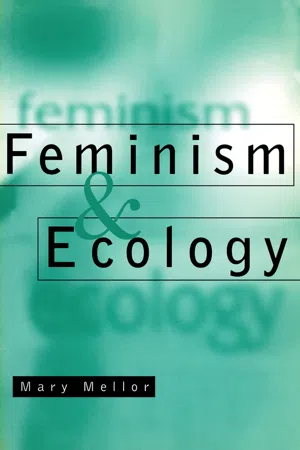Politics & International Relations
Carolyn Merchant
Carolyn Merchant is an influential environmental historian and philosopher known for her work on ecofeminism and the relationship between nature and society. She has explored the intersection of gender, ecology, and politics, and her research has contributed to the understanding of environmental ethics and sustainability. Merchant's work has had a significant impact on the fields of environmental studies and feminist theory.
Written by Perlego with AI-assistance
Related key terms
1 of 5
3 Key excerpts on "Carolyn Merchant"
- eBook - ePub
The Ethics and Aesthetics of Eco-caring
Contemporary Debates on Ecofeminism(s)
- Margarita Estévez-Saá, María Jesús Lorenzo-Modia, Margarita Estévez-Saá, María Jesús Lorenzo-Modia(Authors)
- 2020(Publication Date)
- Routledge(Publisher)
The Death of Nature (1980). These authors still operated with dualisms such as woman-nature that worked in opposition to that of men-culture. Notwithstanding, they privileged the first of these pairs in an attempt to reconsider and reassess a reverence and respect for nature and for women that, according to their diverse interpretations, had been lost. Thus, in the case of Carolyn Merchant, it was the scientific revolution that fostered the separation of nature from culture and the devaluation of the former as dead, inert, and mechanistic.Other early ecofeminists perceived the beginnings of the degradation of women and nature in the establishment of patriarchal societies that substituted previous matriarchal cultures, and the replacement of those goddess religions that regarded the earth and women as sacred, by patriarchal male deities who opted for the domination of both nature and women. A psychological explanation has also been offered, and thus there are ecofeminists who, following the works of feminist psychoanalysts Dorothy Dinnerstein and Nancy Chodorov, note the effects of a sexually differentiated personality or consciousness-formation that separates girls, who experience a continuum between self and mother, and boys, whose identity is constructed oppositionally. Kate Sandilands has summarized this position in the following terms:To ecofeminists, this masculine separation from both human mother and Mother Earth (joined together as embodiment of dependency, as forming together the primal state from which humanity emerges, or even as threats to masculine selfhood because of their generative capacities) results in men’s desire to subdue both women and Nature in a quest for individual potency and transcendence. The male Self is not experienced as part of Nature, but is locked in a constant battle to conquer a primordial feminine Oneness. … As a result of women’s responsibilities for childcare and processes of maintain life, as a result of women’s participation in creation of new life, as a result of women’s location as a “bridge” between the “natural” world of infants and the “cultural” world of adults, and/or as a result of women’s “soft” ego boundary development, women’s connectedness to other humans and to the world of Nature is created and recreated generationally. (91) - eBook - ePub
Ecofeminist Natures
Race, Gender, Feminist Theory and Political Action
- Noel Sturgeon(Author)
- 2016(Publication Date)
- Routledge(Publisher)
For instance, Ynestra King, Karen Warren, Carolyn Merchant, and others, posit women’s relation to the environment as socially constructed and/or arising out of historical, materialist conditions; further, these writers see women’s environmental mobilization as arising out of women’s political agency rather than their essential similarity to nature. Rao, writing a little earlier than either Jackson or Agarwal, similarly locates problems of essentialism in what she sees, from her historical position, as an “emergent” set of studies (she does not immediately identify ecofeminist work in this category) concerned with the effects of a process she calls “capitalization of nature”: i.e., “colonial and capitalist practices, and the so-called development schemes sponsored by international organizations like the World Bank.” 3 These studies, Rao claims, whether they are dealing with women as victims of the capitalization of nature or as heroic environmental activists, “… are based on almost identical conceptions of … the proximity of women to nature.” 4 Note that Rao identifies specifically political conceptions of indigenous women-as-victims and therefore women-as-activists as the moment when essentialist notions are constructed. 5 Whether the close relationship between women and nature is seen as biologically based or produced from women’s material location in socially produced divisions of labor, Rao argues that these conceptions “perpetuate an essentialist construction of women and tribals based on nostalgic presuppositions of how they might have existed in some distant past.” 6 Having sculpted this approach from “emergent” development discourses, Rao then identifies it with “eco-feminism” by using Shiva’s work as representative of this position. 7 Here again, a reductionist move results in tagging all ecofeminism with the label “essentialist.” A much fairer rendition of the relationship between ecofeminism and development discourse—one that includes the internal - eBook - ePub
- Mary Mellor(Author)
- 2013(Publication Date)
- Polity(Publisher)
What is distinctive about ecofeminism is that it sees the subordination of women and ecological destruction as linked. The nature of this link has been central to this book. If, as affinity ecofeminists suggest, this link is between all women and nature, the specificity of western society is problematic. However, as we have seen very few ecofeminists ultimately rest their case on biological determinism. Even where a universalized notion of patriarchy is proposed, the political focus is upon the western form. This would lead to a more socially and historically contingent view of the relation between women’s subordination and ecological destruction. They have come together at a particular historical point and in a particular socio-cultural formation. Ecofeminists disagree about where, historically, this point comes. Some suggest that the dawn of (European) history came with the invasion of ‘matriarchal’ Old Europe by patriarchal ‘Kurgans’, others with (western) male-dominated religion, philosophy or science, and yet others with the emergence of hierarchy, private property or industrial capitalism.Whatever the historical location or explanation given, ecofeminists have a strong, not a weak, notion of contingency. As Plumwood argues, the connection between women and nature points to ‘structure not coincidence’ (1994: 64). For many ecofeminists, particularly those with a theological or a philosophical background, this structure resides in the forms of knowledge and belief that justify and sustain western patriarchy. In particular, the Christian and rationalist rejection of the body and the prioritization of mind or soul (Ruether 1975). Women are essentialized, naturalized and condemned by their association with the body. I have argued that a purely cultural explanation for the oppression of women and exploitation of nature lacks any material or historical explanation of why this should occur. It is an idealist perspective whose only political solution is a struggle around ideas. Instead, I have argued for a materialist perspective on the woman–nature connection. However, the dualism at the heart of western patriarchy is both material and cultural, based on a sharp distinction between body and mind/soul, society/culture and nature, and between men and women. From Plato’s prioritization of abstract thought to Descartes’ distinction between mind and body; from Aristotle’s sphere of freedom in the life of the polis as against the sphere of necessity in the world of the oikos,
Index pages curate the most relevant extracts from our library of academic textbooks. They’ve been created using an in-house natural language model (NLM), each adding context and meaning to key research topics.


